吉林省汪清县四中2019 2020高一英语上学期第二次阶段考试试题
- 格式:doc
- 大小:37.52 KB
- 文档页数:10
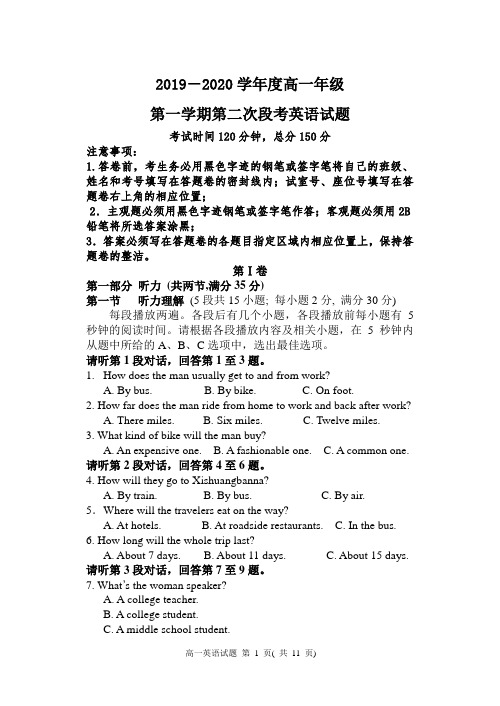
2019-2020学年度高一年级第一学期第二次段考英语试题考试时间120分钟,总分150分注意事项:1.答卷前,考生务必用黑色字迹的钢笔或签字笔将自己的班级、姓名和考号填写在答题卷的密封线内;试室号、座位号填写在答题卷右上角的相应位置;2.主观题必须用黑色字迹钢笔或签字笔作答;客观题必须用2B 铅笔将所选答案涂黑;3.答案必须写在答题卷的各题目指定区域内相应位置上,保持答题卷的整洁。
第Ⅰ卷第一部分听力(共两节,满分35分)第一节听力理解(5段共15小题; 每小题2分, 满分30分) 每段播放两遍。
各段后有几个小题,各段播放前每小题有5秒钟的阅读时间。
请根据各段播放内容及相关小题,在5秒钟内从题中所给的A、B、C选项中,选出最佳选项。
请听第1段对话,回答第1至3题。
1.How does the man usually get to and from work?A. By bus.B. By bike.C. On foot.2. How far does the man ride from home to work and back after work?A. There miles.B. Six miles.C. Twelve miles.3. What kind of bike will the man buy?A. An expensive one.B. A fashionable one.C. A common one. 请听第2段对话,回答第4至6题。
4. How will they go to Xishuangbanna?A. By train.B. By bus.C. By air. 5.Where will the travelers eat on the way?A. At hotels.B. At roadside restaurants.C. In the bus.6. How long will the whole trip last?A. About 7 days.B. About 11 days.C. About 15 days. 请听第3段对话,回答第7至9题。
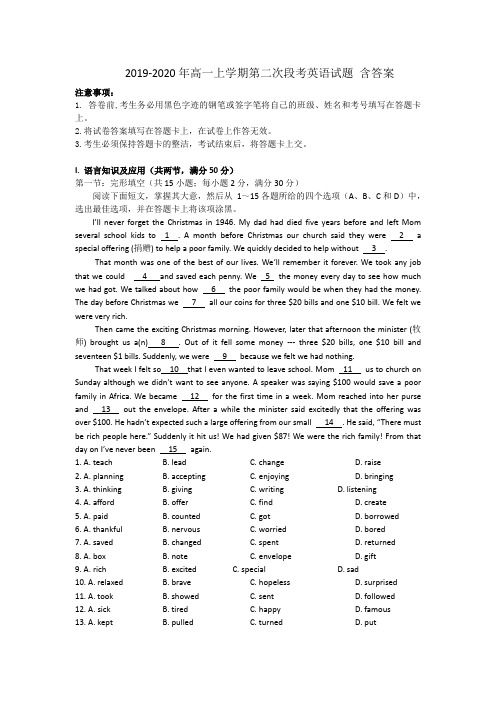
2019-2020年高一上学期第二次段考英语试题含答案注意事项:1. 答卷前,考生务必用黑色字迹的钢笔或签字笔将自己的班级、姓名和考号填写在答题卡上。
2.将试卷答案填写在答题卡上,在试卷上作答无效。
3.考生必须保持答题卡的整洁,考试结束后,将答题卡上交。
I. 语言知识及应用(共两节,满分50分)第一节:完形填空(共15小题;每小题2分,满分30分)阅读下面短文,掌握其大意,然后从1~15各题所给的四个选项(A、B、C和D)中,选出最佳选项,并在答题卡上将该项涂黑。
I’ll never forget the Christmas in 1946. My dad had died five years before and left Mom several school kids to 1 . A month before Christmas our church said they were 2 a special offering (捐赠) to help a poor family. We quickly decided to help without 3 .That month was one of the best of our lives. We’ll remember it forever. We took any job that we could 4 and saved each penny. We 5 the money every day to see how much we had got. We talked about how 6 the poor family would be when they had the money. The day before Christmas we 7 all our coins for three $20 bills and one $10 bill. We felt we were very rich.Then came the exciting Christmas morning. However, later that afternoon the minister (牧师) brought us a(n) 8 . Out of it fell some money --- three $20 bills, one $10 bill and seventeen $1 bills. Suddenly, we were 9 because we felt we had nothing.That week I felt so 10 that I even wanted to leave school. Mom 11 us to church on Sunday although we didn’t want to see anyone. A speaker was saying $100 would save a poor family in Africa. We became 12 for the first time in a week. Mom reached into her purse and 13 out the envelope. After a while the minister said excitedly that the offering was over $100. He hadn’t expected such a large offering from our small 14 . He said, “There must be rich people here.” Suddenly it hit us! We had given $87! We were the rich family! From that day on I’ve never been 15 again.1. A. teach B. lead C. change D. raise2. A. planning B. accepting C. enjoying D. bringing3. A. thinking B. giving C. writing D. listening4. A. afford B. offer C. find D. create5. A. paid B. counted C. got D. borrowed6. A. thankful B. nervous C. worried D. bored7. A. saved B. changed C. spent D. returned8. A. box B. note C. envelope D. gift9. A. rich B. excited C. special D. sad10. A. relaxed B. brave C. hopeless D. surprised11. A. took B. showed C. sent D. followed12. A. sick B. tired C. happy D. famous13. A. kept B. pulled C. turned D. put14. A. class B. church C. family D. room15. A. angry B. healthy C. quiet D. poor第二节:语法填空(共10小题,每小题2分,满分20分)阅读下面短文,根据上下文填入适当的词语,或使用括号中的词语的适当形式填空,并将答案填写在答题卡上标号为16—25的相应位置。
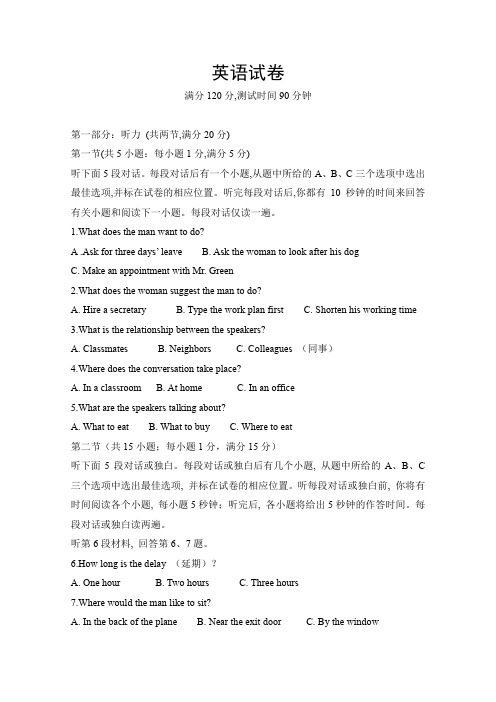
英语试卷满分120分,测试时间90分钟第一部分:听力(共两节,满分20分)第一节(共5小题:每小题1分,满分5分)听下面5段对话。
每段对话后有一个小题,从题中所给的A、B、C三个选项中选出最佳选项,并标在试卷的相应位置。
听完每段对话后,你都有10秒钟的时间来回答有关小题和阅读下一小题。
每段对话仅读一遍。
1.What does the man want to do?A .Ask for three days’ leave B. Ask the woman to look after h is dogC. Make an appointment with Mr. Green2.What does the woman suggest the man to do?A. Hire a secretaryB. Type the work plan firstC. Shorten his working time3.What is the relationship between the speakers?A. ClassmatesB. NeighborsC. Colleagues (同事)4.Where does the conversation take place?A. In a classroomB. At homeC. In an office5.What are the speakers talking about?A. What to eatB. What to buyC. Where to eat第二节(共15小题;每小题1分,满分15分)听下面5段对话或独白。
每段对话或独白后有几个小题, 从题中所给的A、B、C 三个选项中选出最佳选项, 并标在试卷的相应位置。
听每段对话或独白前, 你将有时间阅读各个小题, 每小题5秒钟;听完后, 各小题将给出5秒钟的作答时间。
每段对话或独白读两遍。
听第6段材料, 回答第6、7题。
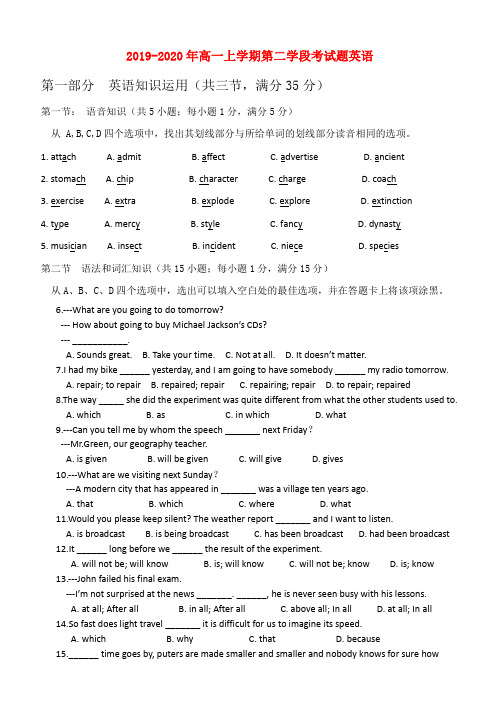
2019-2020年高一上学期第二学段考试题英语第一部分英语知识运用(共三节,满分35分)第一节:语音知识(共5小题;每小题1分,满分5分)从 A,B,C,D四个选项中,找出其划线部分与所给单词的划线部分读音相同的选项。
1. attach A. admit B. affect C. advertise D. ancient2. stomach A. chip B. character C. charge D. coach3. exercise A. extra B. explode C. explore D. extinction4. type A. mercy B. style C. fancy D. dynasty5. musician A. insect B. incident C. niece D. species第二节语法和词汇知识(共15小题;每小题1分,满分15分)从A、B、C、D四个选项中,选出可以填入空白处的最佳选项,并在答题卡上将该项涂黑。
6.---What are you going to do tomorrow?--- How about going to buy Michael Jackson’s CDs?--- ___________.A. Sounds great.B. Take your time.C. Not at all.D. It doesn’t matter.7.I had my bike ______ yesterday, and I am going to have somebody ______ my radio tomorrow.A. repair; to repairB. repaired; repairC. repairing; repairD. to repair; repaired8.The way _____ she did the experiment was quite different from what the other students used to.A. whichB. asC. in whichD. what9.---Can you tell me by whom the speech _______ next Friday?---Mr.Green, our geography teacher.A. is givenB. will be givenC. will giveD. gives10.---What are we visiting next Sunday?---A modern city that has appeared in _______ was a village ten years ago.A. thatB. whichC. whereD. what11.Would you please keep silent? The weather report _______ and I want to listen.A. is broadcastB. is being broadcastC. has been broadcastD. had been broadcast12.It ______ long before we ______ the result of the experiment.A. will not be; will knowB. is; will knowC. will not be; knowD. is; know13.---John failed his final exam.---I’m not surprised at the news _______. ______, he is never seen busy with his lessons.A. at all; After allB. in all; After allC. above all; In allD. at all; In all14.So fast does light travel _______ it is difficult for us to imagine its speed.A. whichB. whyC. thatD. because15.______ time goes by, puters are made smaller and smaller and nobody knows for sure howsmall _______ be made but there must be a limit.A. With; they canB. As; they canC. When; they canD. While; can they16.To our ______, Jane’s illness proved not to be as serious as expected before.A. judgementB. reliefC. opinionD. hope17.No one has e up with a better explanation of why dinosaurs ________ .A. died awayB. died ofC. died forD. died out18.The teacher suggested that much attention should ________ the spelling mistakes.A. pay forB. pay toC. be paid forD. be paid to19.There are two buildings, __________ stands nearly a hundred feet high.A. the largerB. the larger of whichC. the larger one thatD. the larger of them20.Though I like making __________, I hate those dirty jokes _______ me.A. a fun; made ofB. fun; played onC. funs; made onD. fun; put on第三节完形填空(共15小题;每小题1分,满分15分)阅读下面短文,从短文后各题所给的四个选项中,选出可以填入空白处的最佳选项。
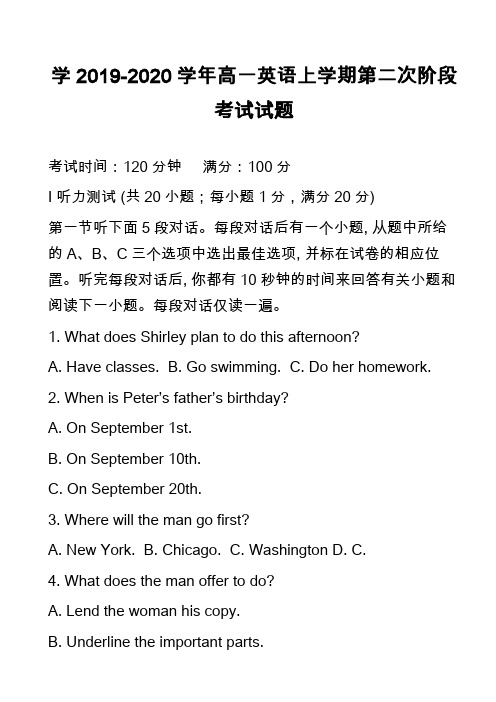
学2019-2020学年高一英语上学期第二次阶段考试试题考试时间:120分钟满分:100分I 听力测试 (共20小题;每小题1分,满分20分)第一节听下面5段对话。
每段对话后有一个小题, 从题中所给的A、B、C三个选项中选出最佳选项, 并标在试卷的相应位置。
听完每段对话后, 你都有10秒钟的时间来回答有关小题和阅读下一小题。
每段对话仅读一遍。
1. What does Shirley plan to do this afternoon?A. Have classes.B. Go swimming.C. Do her homework.2. When is Peter’s father’s birthday?A. On September 1st.B. On September 10th.C. On September 20th.3. Where will the man go first?A. New York.B. Chicago.C. WashingtonD. C.4. What does the man offer to do?A. Lend the woman his copy.B. Underline the important parts.C. Accompany the woman to the bookstore.5. What will the man probably do tomorrow afternoon?A. Attend a meeting.B. Meet the woman.C. See a film.第二节听下面5段对话或独白。
每段对话或独白后有几个小题,从题中所给的A、B、C三个选项中选出最佳选项,并标在试卷的相应位置。
听每段对话或独白前,你将有时间阅读各个小题,每小题5秒钟;听完后,各小题将给出5秒钟的作答时间。
每段对话或独白读两遍。
听下面一段对话,回答第6和第7两个小题。
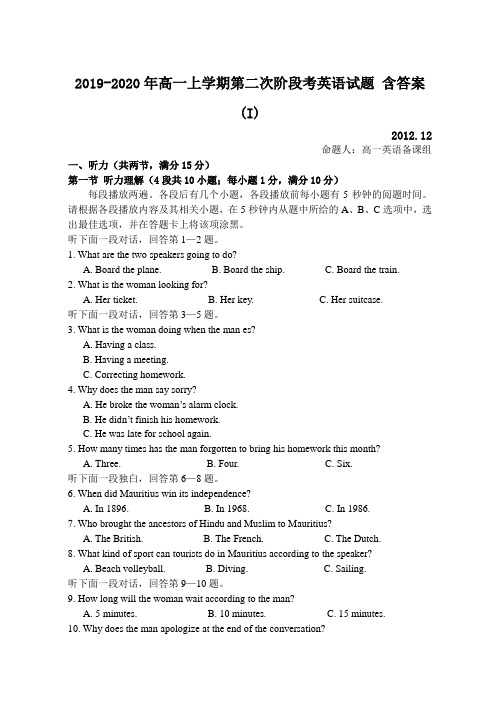
2019-2020年高一上学期第二次阶段考英语试题含答案(I)2012.12命题人:高一英语备课组一、听力(共两节,满分15分)第一节听力理解(4段共10小题;每小题1分,满分10分)每段播放两遍。
各段后有几个小题,各段播放前每小题有5秒钟的阅题时间。
请根据各段播放内容及其相关小题,在5秒钟内从题中所给的A、B、C选项中,选出最佳选项,并在答题卡上将该项涂黑。
听下面一段对话,回答第1—2题。
1. What are the two speakers going to do?A. Board the plane.B. Board the ship.C. Board the train.2. What is the woman looking for?A. Her ticket.B. Her key.C. Her suitcase.听下面一段对话,回答第3—5题。
3. What is the woman doing when the man es?A. Having a class.B. Having a meeting.C. Correcting homework.4. Why does the man say sorry?A. He broke the woman’s alarm clock.B. He didn’t finish his homework.C. He was late for school again.5. How many times has the man forgotten to bring his homework this month?A. Three.B. Four.C. Six.听下面一段独白,回答第6—8题。
6. When did Mauritius win its independence?A. In 1896.B. In 1968.C. In 1986.7. Who brought the ancestors of Hindu and Muslim to Mauritius?A. The British.B. The French.C. The Dutch.8. What kind of sport can tourists do in Mauritius according to the speaker?A. Beach volleyball.B. Diving.C. Sailing.听下面一段对话,回答第9—10题。
2019-2020年高一上学期第二次段考(英语)第一部分听力(共两节,满分30分)第一节(共5小题;每小题1.5分,满分7.5分)听对话,选择正确答案。
1. What does the woman do?A. A teacherB. A nurseC. A sales woman2. Where are the man and the woman?A. In the marketB. In the bedroomC. In the kitchen3. How many stories is Mary going to read next term?A. TwoB. SevenC. Five4. What does the woman mean?A. She does not agree with JackB. Jack’s performance is disappointingC. Most people think that the Winter Olympics are boring5. What does the man think of the talk?A. It’s useful for nobodyB. It’s interestingC. He doesn’t like it at all第二节(共15小题;每小题1.5分,满分22.5分)听第6段材料,回答第6至7小题。
6. Which place hasn’t the man visited?A. The Great Wall.B. The Empire State BuildingC. The ancient city Pompeii7. What is Peter busy doing?A. Working in his labB. Working in other countries.C. Traveling in other countries.听第7段材料,回答第8至9小题。
2019-2020年高一英语上学期第二次阶段考试试题第一部分听力(共两节,满分30分)第一节(共5小题;每小题1分,满分5分)听下面5段对话。
每段对话后有一个小题,从题中所给的A、B、C三个选项中选出最佳选项,并标在试卷的相应位置。
听完每段对话后,你都有10秒钟的时间来回答有关小题和阅读下一小题。
每段对话仅读一遍。
1. What does the man think of Linda’s husband?A. Clever.B. Unfriendly.C. Quiet.2. What will the weather be like on Friday?A. Rainy.B. Windy.C. Sunny.3. What are the speakers talking about?A. A hotel.B. An airport.C. A hospital.4. What does the man suggest doing?A. Going fishing.B. Staying at home.C. Buying some books.5. What is in the man’s bag?A. Some CDs.B. Some bottles.C. Some books.第二节(共15小题;每小题1分,满分15分)听下面5段对话或独白。
每段对话或独白后有几个小题,从题中所给的A、B、C三个选项中选出最佳选项,并标在试卷的相应位置。
听每段对话或独白前,你将有时间阅读各个小题,每小题5秒钟;听完后,各小题将给出5秒钟的作答时间。
每段对话或独白读两遍。
听第7段材料,回答第6、7题。
6. What does the woman usually do on Saturdays?A. She goes swimming.B. She plays basketball.C. She goes shopping.7. When does the woman usually go to the cinema with friends?A. On Friday nights.B. On Saturday nights.C. On Sunday nights.听第7段材料,回答第8、9题。
2019-2020年高一英语上学期第二次学段(期末)考试试题第一部分阅读(共两节,满分30)第一节阅读理解(每小题2分,共20分)AWhen I was a boy, I used to love walking in the woods around my home. My mom warned me several times never to travel so far that I would lose sight of the house. Being a typical boy, however, I soon found myself hiking further and further away, testing just how far I could go into the woods without getting lost. After losing my way once for two hours, though, I decided that I had better leave a trail the next time I went for a walk.The very next day I decided to try it. I walked into the woods until the house was out of sight. Then I broke a small branch on a young tree to mark my place. I wandered further in and broke another limb and then another. In a few spots where there were no limbs small enough, I snapped the heads off the low plants that were growing where the sunlight broke through the trees. After a while I finally got tired and decided to head back. Turning around I easily found my tracks, but instead of being proud I felt sad. I could see the trail of destruction I had left in the woods going on and on. Looking at the broken limbs and dead flowers I wondered if God was disappointed in me and I vowed never to do that again. Instead, I started to cherish my times alone in the woods with nature. I’d sit by the streams and listen to them sing. I’d watch the birds and squirrels. I’d bend down to smell the flowers. And I even buried an acorn or two hoping that one day an Oak might grow.There is an old Native American Saying th at goes “We will be known forever by the tracks we leave.” As I have grown older and wiser, I have done my best to never leave a trail of destruction in my life as I did in the woods that day. I have instead tried to leave tracks of love, kindness, goodness, and compassion and I have strived to show others that they can do the same. May you always leave tracks of joy as you follow your own trail of love.1. When the boy headed back from the woods, he felt sad because ______.A. he lost his way in the woodsB. he could find his tracks so easilyC. he left many trails of destructionD. God was very disappointed in him2. The boy took off some branches to ______.A. protect himselfB. make his way outC. see the sun clearlyD. leave some marks3. The author wrote the passage to ______.A. call on us to leave tracks of virtues in lifeB. inform us that we shouldn’t destroy treesC. tell us how to avoid getting lost in the woodsD. show us ways to get back home in the forestBDr. Michael Prager, a leading Botox expert, said that a growing number of women are developing something called “computer face”. He also mentioned that professionals who worked long hours in front of a screen were ending up with saggy jowls(颚骨), “turkey neck” and deep-set wrinkles on their forehead and around their eyes.The Botox expert said that, of all his clients, office workers were most likely to show premature(过早的)signs of ageing. “If you are one of the unfortunate people who frown(皱眉)while you are concentrating on the screen then, over time, you will inevitably end up with frown lines,” Dr. Prager said. “What is perhaps more surprising is the number of women with saggy jowls because they are sitting in one position for so long. If you spend most of the time looking down then the neck muscles shorten and go saggy, eventually giving you a second neck. “Dr. Prager, who has a practice near Harley Street in London, said he encourages his clients to put a mirror next to their computer so they can see if they are frowning at the screen. “When people are stressed or thinking hard about something, then they will often put on a ‘grumpy(脾气暴躁的)face’ without even knowing what they are doing. When my clients put a mirror next to their desk, they are often shocked by the angry, fro wning face which stares back at them.”He said, “The women I am seeing at the moment have only been using computers at work for the last decade or so. But women in their 20s have grown up with them and use them for every single task. I think the problem is going to become much, much worse. In another ten years, they could be looking quite awful.”Dr. Prager said there were several simple steps which could avoid “computer face” such as regular screen breaks and stretching the neck muscles. And, of course, there was always Botox. He said that, after a couple of sessions of Botox, the habitof “grumpy face” could be broken.4. In what way do women develop a “computer face”?A. Frowning every now and then.B. Concentrating on computers frequently.C. Working for too long in front of a screen.D. Sitting in the same place for a long time.5. According to the passage, which of the following are signs of ageing?A. Saggy jowls and short necks.B. Turkey neck and frown lines.C. Deep-set wrinkles and angry faces.D. Second neck and stressed muscles.6. From the last 2 paragraphs, we can learn that ______.A. “computer face” is avoidableB. we should give up using computersC. we should break the habit of “grumpy face”D. the younger generation is worse at computersCThe Enigma(谜)of BeautyThe search for beauty spans centuries and continents. Paintings of Egyptians dating back over 4,000 years show both men and women painting their nails and wearing makeup. In 18th-century France, wealthy noblemen wore large wigs (假发) of long, white hair to make themselves attractive. Today, people continue to devote a lot of time and money to their appearance.There is at least one good reason for the desire to be attractive: beauty is power. Studies suggest that good-looking people make more money, get called on more often in class, and are regarded as friendlier.But what exactly is beauty? It’s difficult to describe it clearly, and yet we know it when we see it. And our awareness of it may start at a very early age. In one set of studies, six-month-old babies were shown a series of photographs. The faces on the pictures had been rated for attractiveness by a group of college students. In the studies, the babies spent more time looking at the attractive faces than the unattractive ones.The idea that even babies can judge appearance makes perfect sense to many researchers. In studies by psychologists, men consistently showed a preference for women with larger eyes, fuller lips, and a smaller nose and chin while women prefer men with large shoulders and a narrow waist. According to scientists, the mind unconsciously tells men and women that these traits―the full lips, clear skin, strong shoulders―equal health and genetic well-being.Not everyone thinks the same way, however. “Our hardwiredness can be changed by all sorts of expectations—mostly cultural,” says C. Loring Brace, an anthropologist at the University of Michigan. What is considered attractive in one culture might not be in another. Look at most Western fashion magazines: the women on the pages are thin. But is this “perfect” body type for women worldwide? Scientists’ answer is no; what is considered beautiful is subjective and varies around the world. They found native peoples in southeast Peru preferred shapes regarded overweight in Western cultures.For better or worse, beauty plays a role in our lives. But it is extremely difficult to describe exactly what makes one person attractive to another. Although there do seem to be certain physical traits considered universally appealing, it is also true that beauty does not always keep to a single, uniform standard. Beauty really is, as the saying goes, in the eye of the beholder.7. People’s ideas about beauty _______.A. have existed since ancient timesB. can be easily describedD. are based upon strict criteriaC. have little influence on a person’ssuccess8. In Paragraph 3, the babies in the study _______.A. were rated for their appearanceB. were entered in a beauty contestC. were shown photos of a group of college studentsD. were able to tell attractive faces from unattractive ones9. The underlined word “traits” in Paragraph 4 probably means _______.A. qualitiesB. measurementsC. judgmentsD. standards10. We can learn from the passage that _______.A. the ideas of beauty vary as people grow upB. the search for beauty is rooted in lack of confidenceC. the standards for beauty are based on scientific researchesD. the understanding of beauty depends on cultural backgrounds第二节阅读填空根据短文内容,从短文后的七个选项中选出能填入空白处的最佳选项,选项中有两项多余选项。
英语试卷第一部分听力(共两节,满分20分)第一节(共5小题;每小题1分,满分5分)1.What is the man's wife doing?A.Parking her car. B.Having a dinner.C.Waiting for someone.2.What does the man think of Mr Stone's lessons? A.Helpful. B.Meaningless. C.Boring. 3.What did the woman enjoy of the play?A.The characters. B.The plot. C.The music. 4.What is the woman doing?A.Doing her homework. B.Turning off the radio. C.Listening to the radio.5.What are the speakers mainly talking about?A.A book. B.An exam. C.A question.第二节(共15小题;每小题1.5分,满分22.5分)听第6段材料,回答第6、7题。
6.What does the man's parents want him to be in the future? A.A doctor. B.A soldier. C.A journalist.7.What does the woman like the most?A.Writing. B.Traveling. C.Working.听第7段材料,回答第8、9题。
8.Which kind of sports does the man prefer?A.Surfing. B.Running. C.X-sports.9.When will the two speakers meet this Sunday?A.At 11:30 am. B.At 12:30 pm. C.At 1:30 pm. 听第8段材料,回答第10至12题。
吉林省汪清县四中2019-2020学年高一英语上学期第二次阶段考试试题满分120分,测试时间90分钟第一部分:听力 (共两节,满分20分)第一节(共5小题:每小题1分,满分5分)听下面5段对话。
每段对话后有一个小题,从题中所给的A、B、C三个选项中选出最佳选项,并标在试卷的相应位置。
听完每段对话后,你都有10秒钟的时间来回答有关小题和阅读下一小题。
每段对话仅读一遍。
1.What does the man want to do?A .Ask for three days' leave B. Ask the woman to look after his dogC. Make an appointment with Mr. Green2.What does the woman suggest the man to do?A. Hire a secretaryB. Type the work plan firstC. Shorten his working time3.What is the relationship between the speakers?A. ClassmatesB. NeighborsC. Colleagues (同事)4.Where does the conversation take place?A. In a classroomB. At homeC. In an office5.What are the speakers talking about?A. What to eat B. What to buy C. Whereto eat第二节(共15小题;每小题1分,满分15分)听下面5段对话或独白。
每段对话或独白后有几个小题, 从题中所给的A、B、C三个选项中选出最佳选项, 并标在试卷的相应位置。
听每段对话或独白前, 你将有时间阅读各个小题,每小题5秒钟;听完后, 各小题将给出5秒钟的作答时间。
每段对话或独白读两遍。
听第6段材料, 回答第6、7题。
6.How long is the delay (延期)?A. One hourB. Two hoursC. Three hours7.Where would the man like to sit?A. In the back of the planeB. Near the exit doorC. By the window听第7段材料, 回答第8、9题。
8. When does the conversation take place?A. In the morningB. In the afternoonC. In the evening.9. What does the woman want to eat?A .Tofu only. B. Tofu and cold cucumber C. Beef steak听第8段材料,回答第10至12题。
10. What does the man say about the conference?A. It was well organizedB. All the speakers were not goodC. Some of the topicswere boring11.Why does the man think fewer people made a big difference?A. They can make decisions more quicklyB. There are enough time for all speakersC. They can save more money12.What did people really complain about?1A. The hotelB. The restaurantC. The conference room听第9段材料,回答第13至16题。
13.Why does the woman look upset?A. Her dictionary was lostB. The bus was lateC. Her book was dirty14.What does the man probably think of Sam?A. NiceB. PoorC. Careless15.What will the woman do this afternoon?A. Play table tennisB. Go shoppingC. Visit her friend16.How is the woman going downtown tomorrow?A. By carB. By subwayC. By bus听第10段材料,回答第17至20题。
17.What do you think The Voice is?A.A radio programB.A magazineC.A newspaper18.What kind of volunteers do they need?A. Those who want to get richB. Those who can speak wellC. Those who can plan their time well19.What is the best reason for taking the job according to the speaker?A. To make moneyB. To have funC. To learn to type20.When are volunteers expected to start working?A. ImmediatelyB. Next weekC. Next month第二部分阅读理解(共两节,满分30分)AField Trip DayOn Friday,May 16,our class will take a field trip to North Park Zoo.The zoo has lions,elephants,and other interesting animals.Many of the animals we have been studying will be there for us to closely examine.Our class will be divided into six teams.Each team will have five students and one leader.The leaders are listed in thetable.Team 1 Miss BankerMrs.Team 2 LopezMr.Harper Team 3Miss Abel Team 4Mr.Team 5 SotoMrs.ThomasTeam 6What You Need to KnowThe cost is ﹩1.00 for students to enter the zoo.We will leave the school at 9:00 a.m.and return at 2:30 p.m.On the morning of the trip,the students will be divided into teams.One student from each team will receive a camera.The cameraman will take pictures of the team,2the animals,and other fun sights at the zoo.All members should wear blue shirts.Be sure to wear comfortable shoes became we will be walking all day.Please bring a bag lunch and a drink.We will have a picnic at the park inside the zoo.Bring a healthy snack,such as a piece of fruit and a drink,for later in the day.When we are at the zoo,always remain with your team.Do not leave the team without asking permission from the team leader.Feeding the AnimalsThe ONLY animals that students are allowed to feed are those in the children's Zoo.Special food can be bought at the zoo for 25 cents and given to these animals.Do not feed your lunch to them.It is not food for the animals.21.Any student taking part in this field trip should ______A. spend at least﹩1.00B. carry a cameraC. draw pictures of the animalsD. arrive at the zoo at 9:00a.m.22.In the Children's Zoo,students can ______ .A. move freelyB. feed the animalsC. enjoy their lunchD. get special food for free23.What type of writing is this text? ______A. A news reportB. An announcementC. An introduction to a zooD. A photo competition guideBLouis Armstrong had two famous nicknames. Some people called him Bagamo.Theysaid his mouth looked like a large bag.Musicians often called him Pops, as a sign of respect for his influence on the world of music.Born in 1901 in New Orleans, he grew up poor, but lived among great musicians.Jazz was invented in the city a few years before his birth.Armstrong often said, “Jazz and I grew up together.” Armstrong showed a great talent for music when he was taught to play the cornet (短号) at a boy's home.In his late teens, Armstrong beganto live the life of a musician.He played in parades, clubs, and on the steamboats that traveled on the Mississippi River.At that time, New Orleans was famous forthe new music of jazz and was home to many great musicians.Armstrong learned from the older musicians and soon became respected as their equal.In 1922 he went to Chicago.There, the tale of Louis Armstrong begins.From then until the end of his life, Armstrong was celebrated and loved wherever he went.Armstrong had no equal when it came to playing the American popular song.His cornet playing had a deep humanity (仁爱) and warmth that caused manylisteners to say, “Listening to Pops just makes you feel good all over.” He was the father of the jazz style and also one of the best-known and most admired people in the world.His death, on July 6, 1971, was headline news around the world. 24.Armstrong was called Pops because he ______.A.looked like a musician B.showed an interest in musicC.was a musician of much influence D.traveled to play modern music 25.Which statement about Armstrong is true?A.His tale begins in New Orleans. B.He was born before jazz was invented.3C.He learned popular music at a boy's home..D.His music was popular with his listeners26.Which would be the best title for the text?A.The Invention of the Jazz Music B.The Father of the Jazz StyleC.The Making of a Musician D.The Spread of Popular MusicCA huge cloud of dust rose and an overpass bridge disappeared. This was the scenein Zhuzhou, Hunan Province on May 17. Nine people were killed and 16 injured. Things were similar last year in the Sichuan earthquake. Thousands of people were buried in the ruins and lost their lives. What if we could have warned them? People are always racking their brains to find a way of preventing buildings'collapse(塌). Better materials and technology help, but they are not a solution. Just like humans, a building has its own life cycle from “birth” to “death”.If we know when a building is going to collapse, we can repair it in advance or get out of it before it falls.Now, scientists at the University of Illinois have developed a material that turns red before it breaks. The invention could be used in things like climbing ropesor bridge supports.The research was led by Nancy Sottos, a professor at the university's Beckman Institute, and Douglas Davis, a graduate research assistant.The secret behind the color-changing material is a type of molecule(分子). A molecule is a group of atoms(原子) held together by chemical bonds. Imagine you and your friends standing in a circle, holding hands. Each person stands for one atom,your hands represent the bonds, and the entire circle represents a molecule. If one person lets go of his or her hands, the molecule changes color.The research team put the molecule into a soft material. When the researchers stretched the material, it turned bright red for a few seconds before it broke intotwo pieces. When they repeatedly stretched and relaxed the material, without breaking it, it only turned a little red.The major problem is that light can get rid of the red color. When the team shone bright light on the molecule, the broken bond was fixed, and the color disappeared. If the bright light keeps the red color from appearing,the material's warning system will be useless. Scientists still have a lot of work to do before the color-changing molecules can be used outside the lab.27.What does the passage mainly introduce?A.The collapse of an overpass in Zhuzhou,Hunan Province.B.The Sichuan earthquake last year.C.A material that turns red before it breaks. D.A way of preventing building from collapsing.28.The underlined words “racking their brains” in the third paragraph mean________.A.suffering a lotB.collecting beyond imaginationC.losing a lot4D.thinking very hard29.What is the major problem in the research of the color-changing material? A.Bright light can get rid of the red color.B.When the material is relaxed,the color disappears.C.The material's warning system is useless.D.The molecules only change color in the lab.30.What can we infer from the passage?A.The color-changing molecules are certain to be used outside the lab.B.There will be no collapse with the help of the color-changing material. C.There is a long way to go before the material can be used.D.The problem caused by bright light will be solved by scientists.第二节七选五31 The answer is that the government needs money for many things, for exampleto pay its army, to build public facilities(设施) and to buy goods from abroad, and only the people of the country can supply the money.32 That is, a person pays according to the amount of his income. Whetherhe is a merchant, a doctor, a lawyer, a shopkeeper, a miner, or anything else, he must pay tax(税) if his income is more than a certain amount. This is called a “direct” tax, because it is paid in money direct to the government.Another tax is paid on goods such as watches, jewelry, tobacco, wine, etc. When they are brought into a country, such a tax is paid as part of the price of these goods if they are later sold in shops. 33People usually complain about having to pay taxes, but they forget that the moneyis spent on things that they and their families need. We need policemen to catch thieves, and they must be paid what they earn; children need education and theremust be schools and teachers; we want our streets to be kept clean, and the wages of men who do this kind of work have to be paid. 34 And we cannot have an armywithout paying for it.35 We have no real cause to complain when we are asked to pay taxes forthe good of ourselves and for our fellow citizens.A. Why do people often complain?B. Why must we pay taxes?C.We call it “indirect” tax, because it is paid indirectly through the shopkeeper.D. One of the most important taxes is income tax.E. Taxes, however, should be cancelled(取消).F. Taxes, therefore, cannot be avoided.G.Above all, the country must always be ready to defend itself against attacking enemies.完形填空(共20小题;每小题1.5分,满分30分)There are thousands of people across the United States without any food or shelter. .Every Saturday or Sunday night,my family and I go out and 36 the homeless people in the city.There is one 37_thing I like to mention here. Before we begin our_ 38 ,my family5and I do not eat. We do this 39 we know how it feels to be hungry. We all get togetherin the kitchen and 40 the food. We then_ 41 _the food for 30 or more people. Ilike to write a special 42 on the bags like “God loves you”.A lot of people 43 homeless people. Not all homeless people are bad people. Someare really 44 .Many people hate them for no good reason. In the beginning,whenmy family and I went out on the street, we had to earn(赢得) their 45 . Later,as they 46 us every week,they started to trust us. We 47 know some of theirnames. We all have to keep in mind that they also have 48 .Some of them shake ourhands for giving them food,and 49 us. Some of them do really funny dances becausethey are 50We have become really 51 to a man named Tony and his wife. After meeting with themseveral times,he has told us a lot about his 52 He graduated 53 college and hasa PHD. He used to teach French and Spanish.After we get done(做完某事) feeding the homeless,it makes me appreciate 54 Ihave at home. Sometimes it 55 me sad,and makes my mom cry. I love feeding the homeless, and making a difference in someone's life.36.A. visit B introduce C.save D.feed37.A. hopeful B. exciting C.special D.cruel38.A. show B journey C vacation D.meal39.A. so B.when C.if D.because40.A. design B.prepare C.buy D.give41.A bag B.cook C.fetch D.find42.A. passage B. saying C.note D.article43. A. please B .help C.love D.misunderstand44.A. helpful B.nice C.funny D.beautiful45.A. trust B.trouble C.disadvantage D.suffering46.A. served B.told C.saw D.needed47.A. hardly B.never C.sometimes D.even48.A. words B.looks C.opinions D.feelings49.A. change B.thank C.express D.dislike50.A. happy B.great C.surprised D.angry51.A. low B.high C. far D.close52.A. dream B.future C.life D.friend53. A. from B. in C. for D. at54.A. how B.what C. that D.which55. A. makes B. asks C. orders D. persuades语法填空(15分)There was a time ___1____ I was tired of learning English and disliked speaking English. And this was the reason____2___ my father forced me to join in a 30-day training in an English club before I went to senior high school. When I first came to the club,___2__ I met many strangers, I missed my parents very much. So I packed up my things and wanted to go home. Luckily, my guide, ___4____teacher was Yu Minhong, communicated with me face–to–face, from___5_ I gained some useful instructions. He also introduced a good partner to me, and we got along well with each other.6Gradually I adapted to the life there. Every day I would talk to other teenagers and set down a series of activities ____6__ we did. I should be grateful to my father and the guide, ______7___ encouraged me to fall in love with English. Now I feelit interesting to learn English, into____8___ I put my entire energy. Every day I read my words and passages aloud. In class I join in English discussions. BeforeI go to sleep, I recall the passages through ___9__ I can memorize a large number of new words. ___10__ our English teacher says, “As long as you form the habit of learning English every day and have perseverance, you will master English sooneror later.”短文改错(10分)We'll never forget the day that my classmates and I paid a visit of a chemistry factory last week. It was a large one with nearly 20,000 workers. We could saw colorful flowers, grass and trees anywhere. We also visit some workshops and saw the workers working hardly. We talked to them and learned a lot of. We understood them further. In the way home we felt tiring, but we all thought we had a very good day. We really hope we can get more chances of leave the school and learning social experience.书面表达(满分15分)假定你是李华,你的朋友张凯,打算利用假期外出旅游,但不知道该如何准备,写信征求你的意见。